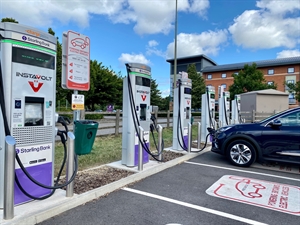RAC calls for measures to reduce costs of public EV charging
Fri 29 November 2024
View all news

The RAC says that there remains a wide gap between the cost of public charging and that paid by EV drivers who are able to charge at home. New data from RAC Charge Watch shows that the average cost of charging at at a lamppost or bollard charger is just under 50p per kilowatt hour, compared with costs as llow as 7p per kW/h for home charging.
There is an even greater disparity between home charging and a rapid pay-as-you-go charge at a commercial site which now stands at an average of just under 80p per kW/h.
The low cost of home charging means that even drivers who are on a standard domestic electricity tariff pay no more than £15.88 to fully charge an electric vehicle from 0% to 100%.
Public charging costs have been rising for several reasons, the RAC says. Firstly, the charging networks which build and operate rapid and ultra-rapid chargers have faced huge increases in some of the charges they pay for the supply of their electricity, including those covering the capacity they will need in the future.
Secondly, it is the same charging networks that are doing the vast majority of the ‘heavy lifting’ when it comes to the vital task of installing and running the country’s EV charging infrastructure, meaning the prices they charge drivers need to be higher to help fund this. The networks are, effectively, building charging stations now to meet drivers’ needs in the future, given that EVs represent less than 4% of the total number of cars on the UK’s roads.
Finally, unlike that which exists for domestic energy customers, there is no price cap applied to electricity bought by businesses including the charging networks.
RAC spokesperson Rod Dennis said: “Our figures highlight the huge gulf in prices between those paid by EV drivers to use public chargers, and those that homeowners with EVs pay at home. On the one hand, anyone who has an off-street parking space and a home charger installed can charge up for just a seventh of the price of using a lamppost or bollard charger off peak where these exist, and less than a tenth of the price of using a high-powered public charger."
ChargeUK CEO Vicky Read said: “We believe reforms are needed to help chargepoint operators offer public charging that is as affordable as possible.
“Operators are faced with significant costs outside their control. VAT charged at 20% for public charging (versus just 5% at home), standing charges for rapid charging that have risen more than 10-fold in the past 18 months, wholesale electricity prices that remain among the highest in the EU28, and the fact that operators in the UK do not benefit from carbon credit schemes, unlike many of our European counterparts.
“We call on the Government and Ofgem to act now to ensure that affordability is not a hurdle in the transition to EVs.”
Zemo Partnership's recently published Roadmap to Net Zero Transport identified the high cost of charging to car drivers without access to off-street charging at home as a significant challenge in terms of a just transition to net zero, as well as a threat to wide EV uptake.
Image: Courtesy EV Clicks
Related Links
< Back to news list